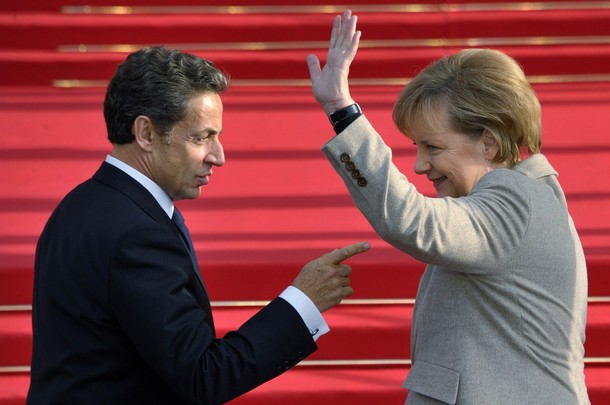
From Steven Erlanger, the New York Times: While the agonies of the European Union — sovereign defaults, deficits and bubbles — unfold like a great wonk drama, at their core is something more intimate: the fractured tale of Angela Merkel and Nicolas Sarkozy. …
[I]t is not an easy relationship. But they know that they need to keep going for the sake of the kids — that is, for the sake of Europe. They have instructed their top foreign-policy advisers, Jean-David Levitte and Christoph Heusgen, both consummate diplomats, to make the relationship function. Some of the symbolism is a stretch — joint cabinet meetings, ceremonies at the Arc de Triomphe and the Berlin Wall. But there is an extraordinarily close coordination between the two staffs, and before every major European Union summit meeting, Sarkozy and Merkel hash out a joint position to take to the other 25 member states. This isn’t very democratic; it probably isn’t very pleasant either. Yet if the European Union is to function, Sarkozy and Merkel have to get along. …
It was from Chancellor Kohl that she learned the importance of pandering to French vanities about being the true beating heart of the European ideal. And then when Kohl got into trouble, his Eastern maiden became Germany’s first female chancellor.
That is when she had to face Sarkozy. “She’s a scientist, almost like a German cliché, planning everything, going step by step, unemotional, not a show horse,” Stefan Kornelius, a senior editor of the Süddeutsche Zeitung, told me. “But Sarkozy’s the kind of macho man that she doesn’t like at all. And she and the chancellery are irritated by his jumping from issue to issue, his lack of attention, his inability to do German systematic work. She’s a technocrat with a hidden husband, and he’s flamboyant, with a beautiful woman” — the singer and former model Carla Bruni — “at his side. …”
FRANCE AND GERMANY, with their shared bloody past, are unlikely allies, and they have radically different notions of how Europe should work. France wants a state-dominated, centralized, bureaucratic Europe in its own image. France also maintains a Mediterranean attitude toward budget deficits, having last balanced a budget 35 years ago. Germany, a federal state with powerful regions, coalition governments and an influential constitutional court, wants a Europe of laws, discipline and fiscal probity, with a strong currency and real penalties for the spendthrift.
Long the financier of the European Union, Germany has made it clear that it will no longer pay for the mistakes and frauds of others. While Germany has always acted in its own interests, the Kohl generation interpreted those interests as being embedded in institutions like NATO and the European Union, which protected the new democratic Germany and kept its ambitions in check. But Germany, reunited, sees NATO as less necessary, even hollow. It needs the European Union less. And it is turning more toward the east — the old Soviet bloc and Russia — for energy and markets. …
As the euro crisis grinds on and the German economy continues to outpace the others, Sarkozy is paying more attention to the German model and giving in more to German demands. He is extremely anxious, aides say, that France is losing its prominence in the new Europe, slipping behind Germany to second-class status. Inside the French cabinet, Germany’s economic model, labor relations and capacity for technical innovation are prominent topics, with German standards — and the fear of losing Paris’s AAA bond rating — driving French reforms and budget cuts.
The cliché used to be that nothing happened in the European Union without French and German agreement. Today France and Germany are regarded as necessary but no longer sufficient. Sarkozy fears, with some justification in a bigger European Union of 27 nations and a euro zone of 17, that French agreement may soon not be needed at all. The new E.U. members to the east are more German in their aspirations than French. The Czechs and Slovaks, as well as the Balts, are all fiscally conservative. Even Poland, which has such an emotional tie to France, sees its economic future with Germany. …
“The Germans have discovered that they are the only serious global economy in Europe, capable of competing with the United States and China,” says John Kornblum, a former American ambassador to Germany. “But they’re afraid their world is coming apart around them, and what they thought would support them, the European Union, is dragging them down. They realized that the stability pact isn’t working, that the Greeks were lying and maybe others, too, that their banks and French banks were deep in the muck, and they understood this is going to cost a lot of money. So they are behaving in a very demanding way, which smells to some like nationalism. But it really is fear. …”
With Germany ascendant and looking both inward and eastward, Britain staying out of the euro zone and France carrying less weight, the question of German leadership is now at the fore. Germany has traditionally avoided trying to lead Europe from the front; memories from World War II, though faded, have not yet gone away in the rest of the continent. Even now, anti-German feeling is rising among Greeks, Portuguese and Spaniards, who feel abandoned, even betrayed, by Berlin. …
John Kornblum, the former American ambassador in Berlin and still a resident there, sees a model for Germany in the United States and the way it helped keep Europe together after the war, mediating disputes and finding compromises. “The Germans don’t see it yet,” he says. “But they will have to take on the role of the United States in Europe, and have the same kind of balancing role we had for such a long time.” At that point, Germany’s marriage with France won’t matter so much anymore. (photo: Reuters)
Image: reuters%201%2014%2011%20Sarkozy%20Merkel%20Deauville.jpg
